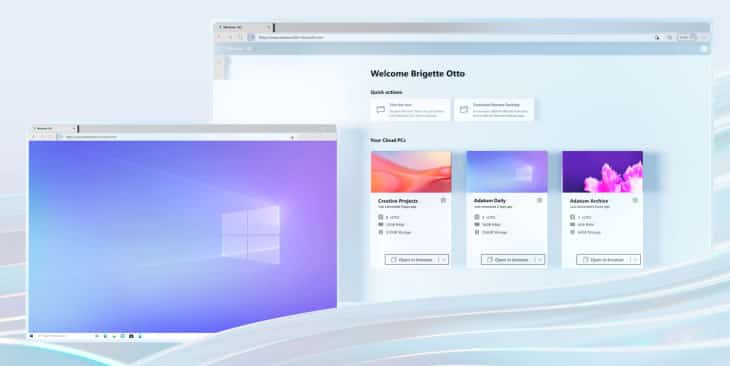This is referred to as cloud computing, and Microsoft is betting on Windows 365 to make the stay-at-home economy more efficient for businesses. This is due to the fact that Windows 365 will be made accessible to companies on August 2 under a variety of subscription options.
Wangui Mckelevy blog post
In a blog post, Wangui McKelvey, general manager at Microsoft, stated that Windows 365 delivers an instant-on boot experience. It will be possible for office employees to utilize Windows on any device that supports a browser because of the quick bootup. Despite the fact that these cloud versions of Windows 10 or Windows 11 will appear the finest on PCs, Microsoft is banking on Windows 365 to reach Macs, iPads, Linux machines, and even Android devices. Windows 365 will be accessible through any contemporary browser, which will undoubtedly include Microsoft Edge and Google Chrome, among other options. Microsoft’s Remote Desktop application will now work with Windows 365 as well. The most significant advantage of utilizing cloud PCs is that you can pick up right where you left off when you log in. It does not matter what device you are using because the operating system does not rely on it, and every Windows-related action takes place on Microsoft’s servers.
What exactly is Windows 365?
Windows 365 provides users with access to all of the applications, settings, and tools that are included with the standard edition of Windows. Workers will be able to use Microsoft Office applications such as PowerPoint, Excel, Word, and the Microsoft Edge browser on their personal or business computer as a result. They will also have the option to download and install applications from the internet via the Microsoft Store. In recognition of the fact that Windows 365 is designed specifically for employees, Microsoft is providing support for products such as Microsoft Dynamics 365 and Microsoft Power Platform. In this Windows edition, there will be a new Program Assure service, which will check for app compatibility and, if necessary, resolve any issues that are discovered. For a computer to be capable of supporting Windows 365, however, there are several hardware requirements that Microsoft has stated on its website. Individual cloud PCs must have at least a single processor, at least 2GB of RAM, and a minimum of 64GB of storage, with the possibility of expanding to 512GB or more.
Windows 365 Membership
Membership includes access to a variety of storage options, which are organized into tiers. Windows 365 is available in two variants, Business, and Enterprise, according to Microsoft. Both versions are available in 12 configurations, with varying processing power options available for corporate users to select from in each. Because Windows 365 is intended for business users, Microsoft has prioritized comfort and simplicity of use as two of the operating system’s primary design principles. As a result, organizations may construct Cloud PCs in minutes and allocate them to employees without having to approve the purchase of specialized computer hardware. Working from home now necessitates that employers provide specialized hardware to their employees, but Windows 365 will eliminate this requirement.
Windows 365 is a cloud-hosted platform
In addition, because Windows 365 is hosted in the cloud, there will be no requirement for VPNs. Virtualization is included in every aspect of Windows 365, including the desktop. Microsoft’s new Windows 365 is not significantly different from the virtual desktops that the company has been providing to companies through Azure Virtual Desktop for some time. Citrix, in addition to Microsoft, has been delivering virtualization for personal computers (PCs) with a variety of choices that organizations may customize on an employee-by-employee basis. Windows 365 has the potential to fundamentally alter the way computers are designed. This means that OEMs will need to provide simple laptops or desktop PCs for low-end activities or tasks that are heavily focused on business because the Windows 365 operating system will operate on them over the cloud. What Microsoft is attempting to do with Windows 365 is only a peek at how workplace cultures would evolve in the aftermath of a pandemic epidemic.

